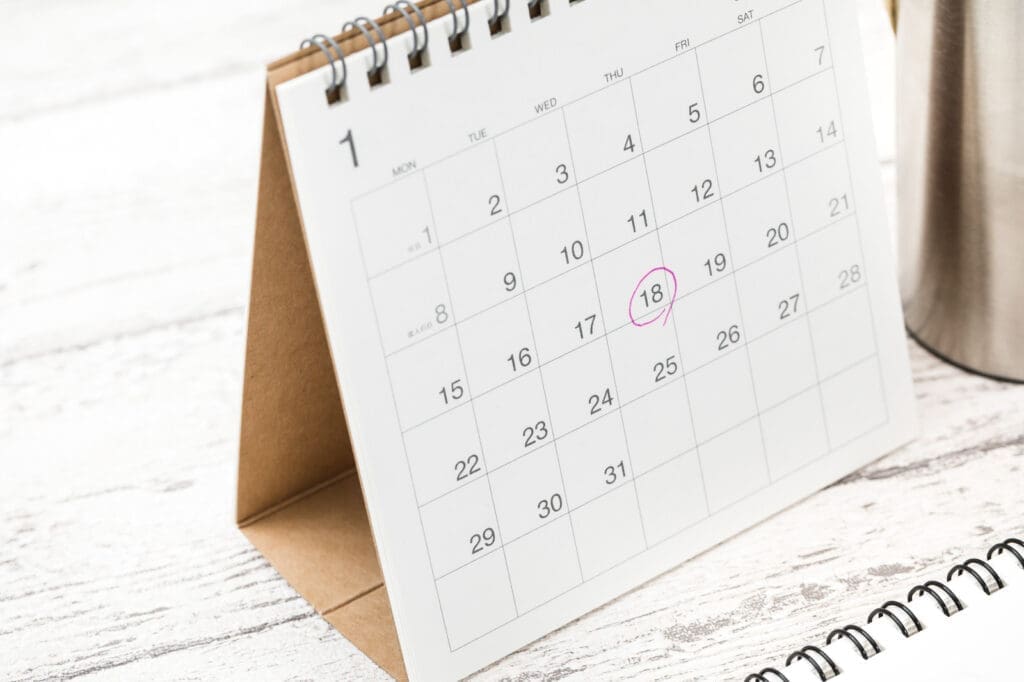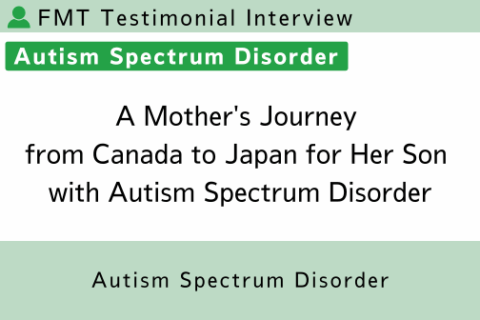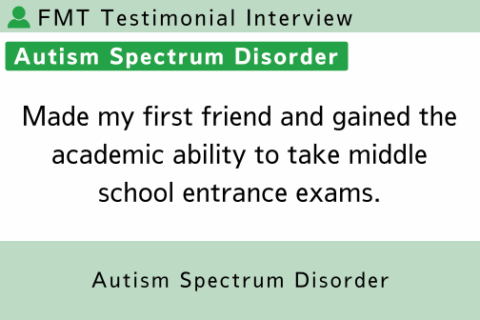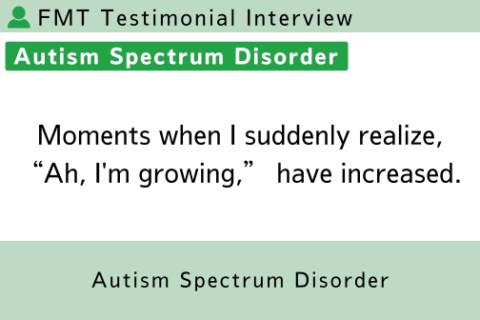We received patient feedback from families of children with autism spectrum disorder.
I think it would be worth it if money wasn’t an issue, because I feel like I’ve accelerated growth.” He answered, “I think it is worth it.
[Profile]
Boy
Disease: autism spectrum disorder
Transplant period: July 31, 2021 – September 4, 2021, November 27, 2021 – March 5, 2022
Number of transplants: 6, additional 3
Medical institution in charge of transplant: Kitamura Clinic, Kiwakai Medical Corporation
Q1. What made you decide to undergo intestinal flora transplantation at our institute?
A teacher at my son’s day-care center recommended it to me because she had done it for her own child and it had been effective. I wanted to try it if there was even a small chance that my son’s condition would improve.
Q2. Did you receive sufficient explanation and support from the medical institution from the time of your transplant application until after the transplant was completed?
It was recommended that he drink hydrogen water, but it was difficult to get him to drink it because he does not drink much water. When we consulted with the office, they recommended “Irohasu,” but we were hesitant to let her drink it because our tests indicated that she consumed too much sugar. I think there is no problem for those who drink water, but we need to consider how to deal with those with ASD who do not understand the necessity of drinking water and do not want to drink water.
In addition, although there was a reduction in problematic behaviors and various growth with each transplant, I think it is necessary to consider how to deal with the hard stools and poor defecation control.
As for the aforementioned, we are consulting with the pediatrician’s family doctor and taking a laxative every day.

Q3. How have your symptoms changed after the transplant?
Prior to transplantation, he was marked by problem behaviors such as throwing things at people, tantrums lasting 40 minutes, and extreme inability to switch. He could not go to crowded places for the first time or in crowded places because he would panic, cry, lie on the floor, and act out. He was always in diapers because he never made any progress in toilet training. He did not speak much and often seemed frustrated because he could not communicate his thoughts. The parents were also exhausted from being pushed around by their son.
After the start of the transplantation, he began to produce a little more words with each passing session. He has come to be able to verbalize the phenomena he sees. Even when going to crowded places, he is now able to walk alone and enjoy his surroundings without panicking. He is now able to go out with his family. Since he is not good at switching between the two, he is now able to switch more than before the transplant by being well guided by an adult. His tantrums have gradually become shorter. Although he continues to throw things, he no longer throws at people. We guided her to the toilet and she urinated in the toilet more often, and 2 months after the transplant, she was able to urinate almost successfully in the toilet. He began to show concern for his sister and to play with her. When they fought over a toy, she was able to lend the toy to her sister.
After the transplant was completed, the tantrums and difficulty switching remained. The tantrums have calmed down within 5-10 minutes and are much shorter than before. He is able to switch without being overly particular by diverting to other topics. Even at meals, when he decides that he can eat a food item even if it is the first time he has been offered it, he is able to eat it without resistance the next time it is offered to him. In order to acquire language, we purchased picture books titled “Yosu no Kotoba” and “Ugokino Kotoba,” and often see them reading them carefully by themselves and trying to understand them.
In addition, he has a bowel movement almost every day and drinks about 400 ml of hydrogen water installed in his home every day. He is now able to defecate almost exclusively in the toilet. The problem of defecation is being resolved without the use of laxatives. His physical ability has also improved, and he is now able to ride a swing, which he could not do before, as well as a bicycle with an auxiliary wheel. He is also able to play the piano if it is a simple piece of music.
Currently, a weekly schedule for his own exclusive use is shown on the whiteboard. When he returns home after finishing his errands, he confirms his schedule for the next day and beyond by saying, “0 (the number of the date), I’m done with daycare. With the weekly schedule displayed, he no longer throws tantrums that consist of, “I’m going to the nursery school. The tantrums that consisted of “I’m going to go to the nursery” have disappeared.

Q4. In order to maintain the intestinal bacteria that became your friends through transplantation, please tell us about any lifestyle habits or ways of thinking that you are trying to maintain after transplantation.
We try to provide well-balanced meals whenever possible. We use frozen foods and retort pouch products less frequently. We encourage them to eat vegetables, even if only a little at a time. We know that water is good for them, so we encourage them to drink water frequently. We always check with each other to see if they have a bowel movement every day.
Q5. What would you say to those who are going to have a transplant or are unsure about it?
IN THE CASE OF ASD, IT CAN BE DIFFICULT TO DETERMINE IF IT IS EFFECT OR GROWTH WHEN THE TRANSPLANT IS IMPLEMENTED AT A YOUNGER AGE. I BELIEVE THAT THE PARENTS ALSO LEARN HOW TO DEAL WITH THE SITUATION, WHICH PLAYS A ROLE IN THE CHANGES THAT OCCUR IN THE INDIVIDUAL. IN ANY CASE, THERE IS A SENSE OF ACCELERATED GROWTH, SO I THINK IT IS WORTHWHILE TO HAVE THE TRANSPLANT IF MONEY IS NOT AN ISSUE.
Q6. Please give a message to the donor who provided the stool for the transplant.
We have no way of knowing who from where, but thank you very much for providing this service for our son, who is a total stranger to us.

Q7. Please let us know any other comments, opinions, or requests you may have.
THE COST OF HYDROGEN WATER SHOULD BE PRESENTED IN ADDITION TO THE COST OF TRANSPLANTATION WHEN EXPLAINING THE PROCEDURE BEFORE TRANSPLANTATION. IT WOULD BE GOOD IF WE CAN SHOW THE EVIDENCE WHEN WE HAVE MORE CASES IN THE FUTURE. I WOULD HAVE LIKED TO KNOW WHAT KIND OF FOOD, WATER, ETC. WERE CONSUMED BY THE OTHER PATIENTS. IF INFORMATION IS DISCLOSED ALONG WITH CHANGES IN INTESTINAL FLORA TEST DATA, I THINK WE CAN INCORPORATE THE GOOD PARTS OF THAT INFORMATION AND MAKE USE OF IT.
I was entering daily questionnaires, but would have liked some advice from the secretariat or others. Entering daily questionnaires also requires a lot of effort. Moreover, since we are paying a high price, it would have been nice to have not only the daily information but also the consolidation of that information and feedback not only once but multiple times.
He was also quite hopeful that the defecation control alone would be better, although he understood that it might not be effective. However, the most disappointing result was that, in fact, the control became poorer than before the transplant and I had to take laxatives every day. Each transplantation made his stools harder and harder, and I wonder if the adjustment of the bacterial solution could have reflected this in any way.
I was told that the leaky gut syndrome may have stopped occurring and the stools may have returned to their original state, but it is not good to continue to have difficulty in defecating, so I think it would be difficult for him to take a laxative every day, even though he is changing variations with various flavors.

















